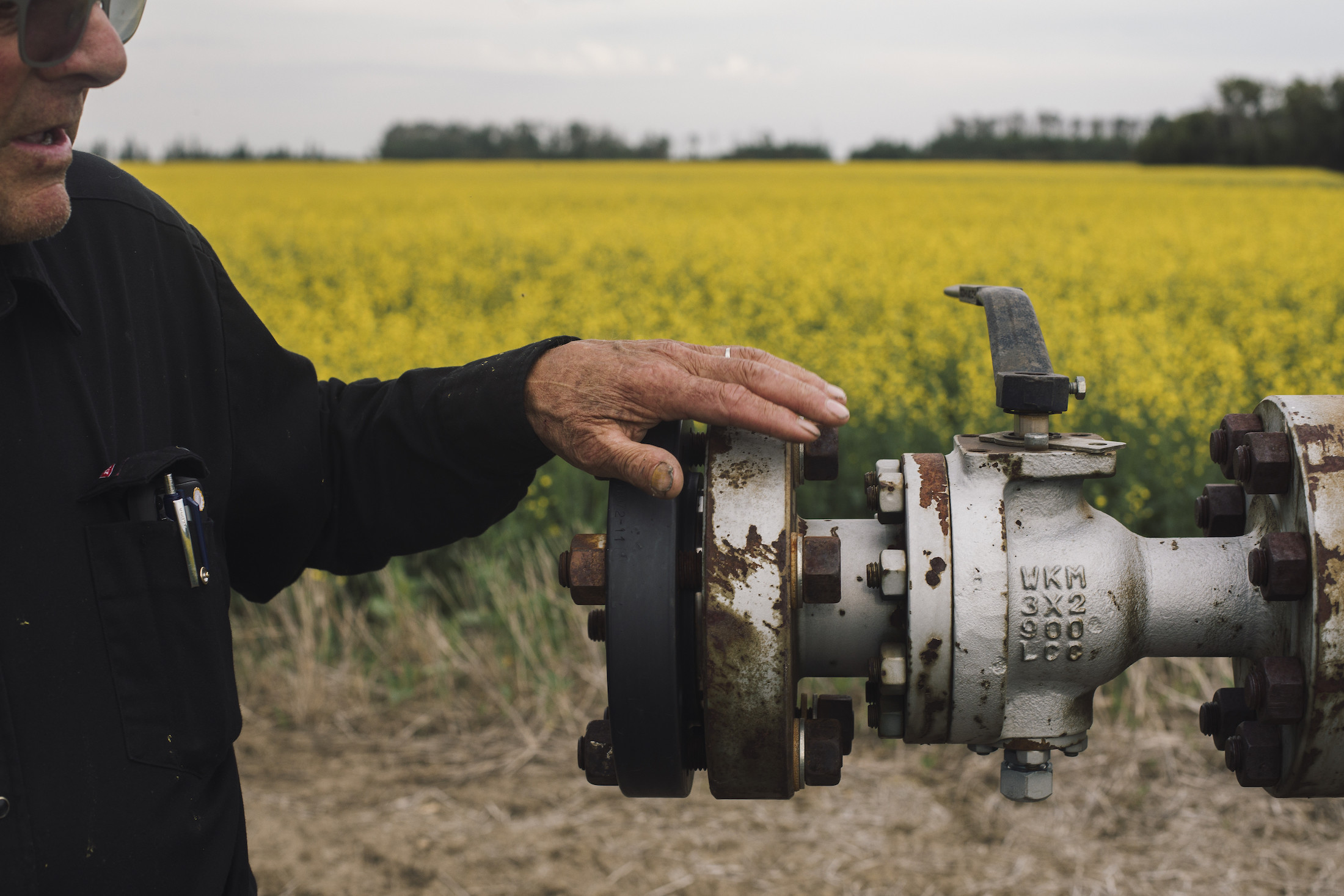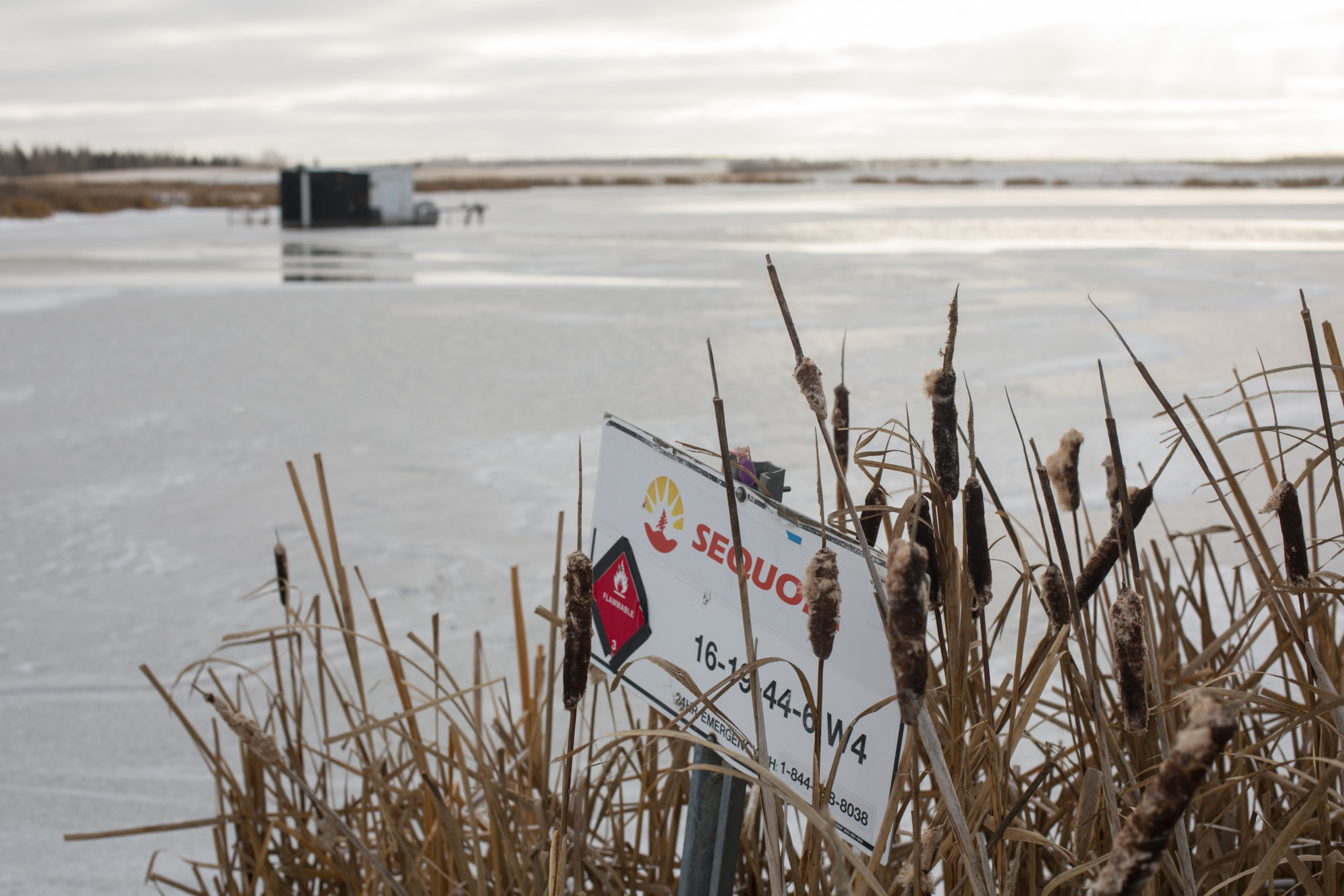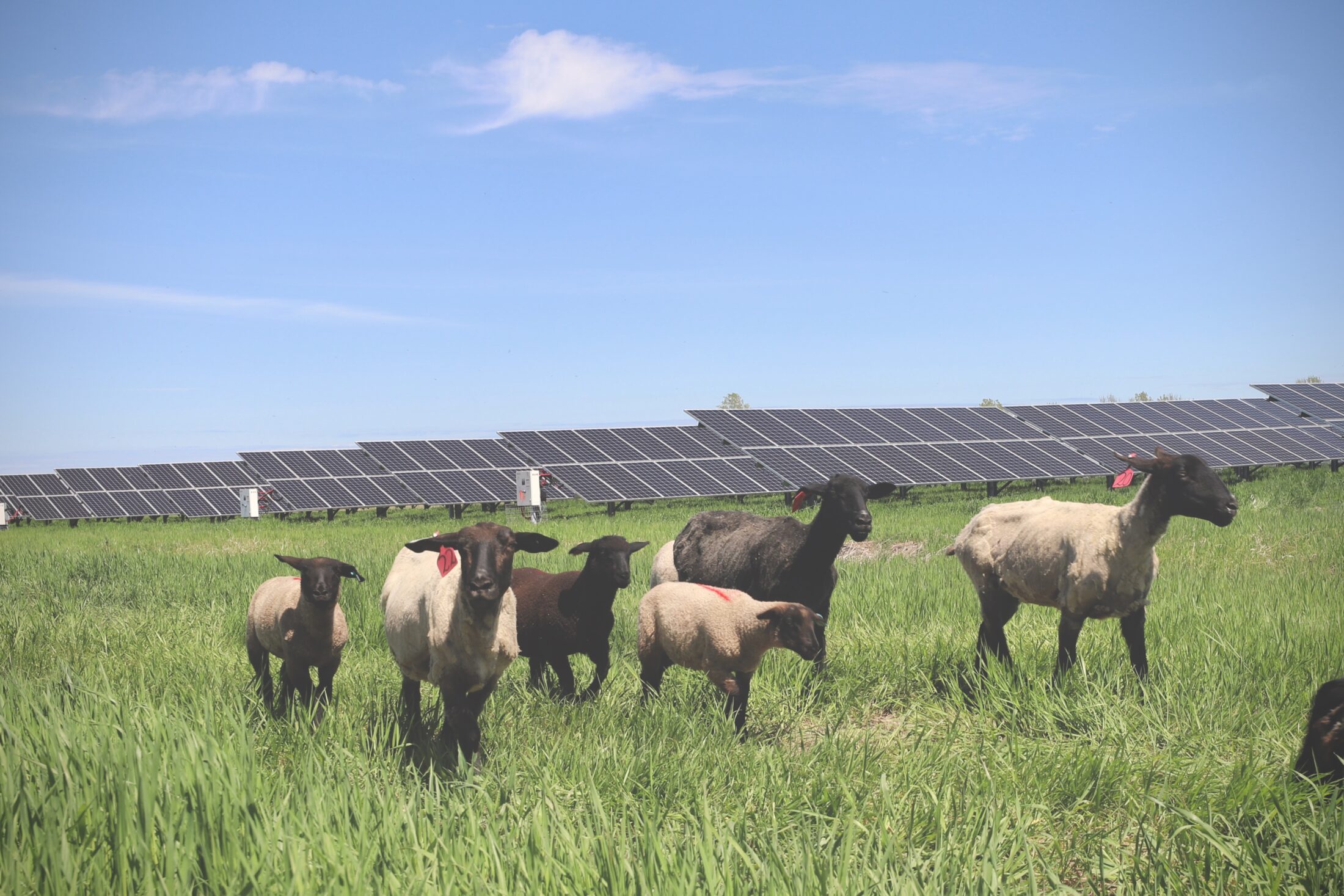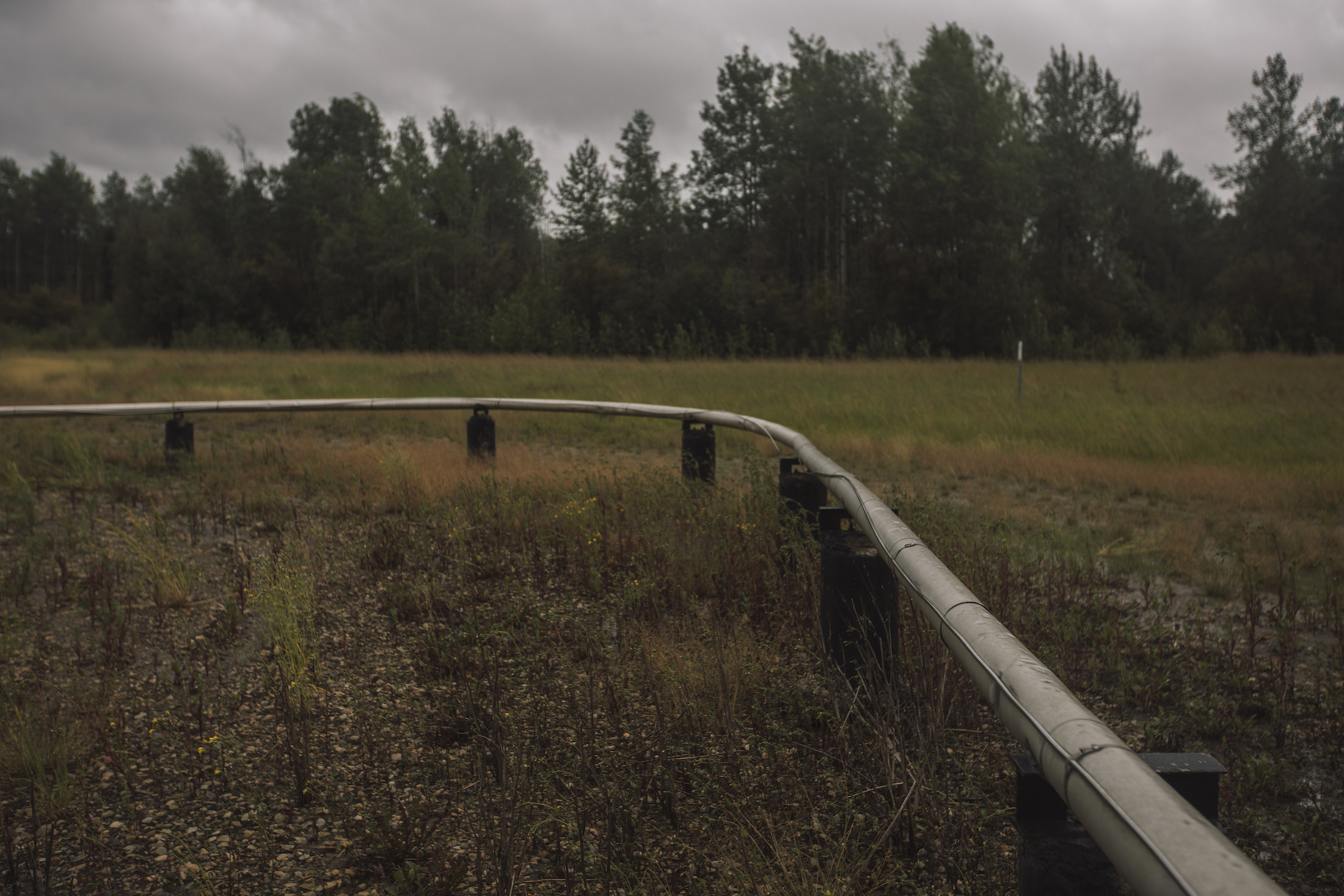
Danielle Smith says separation is about alienation. It’s really about oil
Danielle Smith’s separation rhetoric has been driven by the oil- and secession- focused Free Alberta...
In Northern Sunrise county, east of the Peace River in northern Alberta, there are 866 homes and more than 5,000 cows.
More than 1,000 kilometres of roads connect those homes and farms to nearby communities.
Those roads also connect oil and gas sites to the rest of the province.
It’s an area with rich farmland, and one that has long profited off oil and gas development. The county has spent large sums of money maintaining roads and infrastructure to be used by industry — and now county leadership is increasingly feeling like the oil and gas industry isn’t footing its share of the bill.
“[Oil and gas companies] can’t use our infrastructure without paying,” Reeve Carolyn Kolebaba told The Narwhal. “We do not want to be treated like second-class citizens.”
The county’s story is a familiar one. An oil and gas company, Virginia Hills, built a pipeline across the county. It racked up tax bills. Then it went bankrupt. The county was out $600,000. And that’s just part of the picture.
Kolebaba told The Narwhal outstanding tax debts from oil and gas companies are currently pegged at $3.86 million. The county has already written off nearly $2.7 million in taxes it never expects to collect.
The 2021 budget for the county lists more than $5 million in costs related to roads and road maintenance alone.
“It’s a real hit,” Kolebaba said.
Unpaid oil and gas taxes have been a simmering problem in Alberta in recent years, with the Rural Municipalities of Alberta, the association representing rural counties and municipal districts, reporting a $173-million tab across the province by 2019.
Al Kemmere, the association’s outgoing president, told The Narwhal he expects that number will be even larger this year, particularly with the effects of the COVID-19 pandemic on the industry, though final numbers aren’t yet available.
But unpaid oil and gas taxes have been just part of the struggle for rural communities. The industry has long complained that tax rates are too high. Earlier this year, the Alberta government announced a series of scenarios it was considering to reduce the burden on oil and gas companies. Those scenarios suggested reducing the assessed values of oil and gas assets by between seven and 20 per cent, which would in turn reduce tax bills — and tax revenue.
Rural communities were outraged. As the Rural Municipalities of Alberta noted at the time, “every iteration of each scenario focused on increased tax relief to industry” and “read as a wish list of industry and will cause significant harm to rural municipalities.”
Counties like Northern Sunrise told their citizens the proposals could mean residents’ property taxes would need to increase by more than 500 per cent to make up the shortfall.
Then, in October, the United Conservative Party (UCP) government changed course, announcing what Minister of Municipal Affairs Tracy Allard called “a solution to get us through these tough economic times,” involving extending a 35 per cent reduction in tax rates on shallow gas wells, eliminating taxes on well-drilling equipment and lowering the tax rates for less productive oil and gas wells. The government also announced a three-year pause on property taxes for new wells or pipelines, intended to incentivize new activity.
Speaking at a
government press conference to announce the new plan, Tim McMillan, president and CEO of the Canadian Association of Petroleum Producers, called these changes “a crucial step to help restore investor confidence and preserve and create jobs for Albertans.”
“We don’t view these as tax breaks,” he added, noting the association views this as an interim measure before “correcting” the overall oil and gas tax assessment system.
The new measures, according to communities The Narwhal spoke with, are a compromise — not as harmful as they could have been to rural municipalities, but they still leave a hole in budgets.
Kolebaba is relieved the government didn’t go ahead with its earlier plans. It wasn’t just that the county “dodged a bullet,” she said. “That was a canon. Some of us would have had to turn our keys in to the province.”
Reeve Molly Douglass of Newell County in southern Alberta agrees. “The province sort of tried to do a compromise,” she told The Narwhal. But she said her county is still poised to lose around $5.5 million from its annual tax income as a result.
Combined with large unpaid tax bills — expected to only get larger this year — rural communities across the province are facing an increasingly uncertain future.
When announcing new tax relief measures for industry, the Alberta government noted “low commodity prices, the global economic contraction and the COVID-19 pandemic” have made the economic situation worse for producers.
But Kolebaba doesn’t fully agree. “We didn’t have COVID in 2015 and we were still having to write off taxes,” she said.
Similar situations have cropped up across the province. The County of Stettler wrote off more than $4 million in unpaid oil and gas taxes last year. Big Lakes County wrote off $6 million in the past two years. Lacombe County wrote off $600,000 last year. All of these, of course, were before the pandemic.
“It just doesn’t seem right that part of our economy can go bankrupt and not have to pay municipalities for the services that we have provided them and continue to provide them,” Douglass told The Narwhal.
“This is the only sector that has said they refuse to pay their taxes and there’s a loophole that allows them to get away with it,” Kolebaba said.
When a resident of a rural community doesn’t pay their property tax, the local government can seize the land and auction it off to recover the value of the unpaid bill. With oil and gas companies, the same mechanism is not available. That leaves little incentive for struggling companies to pay up.

Oil and gas companies have long been expected to pay property taxes to rural counties and municipalities but increasingly companies have been unable — or unwilling — to pay. Local officials have long complained of a “loophole” that makes it nearly impossible to force companies to pay. That leaves residents wondering what their tax bills might look like in the future. Photo: Amber Bracken / The Narwhal
While many rural communities are adamant they need the oil and gas industry to continue to be active, there is increasing support for regulatory changes to the way oil and gas companies pay taxes.
“The industry is suffering and we need the industry to be alive on our landscape,” Kemmere of the Rural Municipalities of Alberta told The Narwhal.
But, he said, that doesn’t mean the situation can continue unchecked. “If we don’t fix the unpaid taxes piece, there’s no assurance that members won’t have to increase taxes,” Kemmere said.
Leaders in rural communities are hoping the Alberta government will listen to their concerns during future consultations.
Some, like Kemmere, would like to see a special liens program like the one in Saskatchewan that allows rural communities to put a lien on oil and gas companies with outstanding tax bills.
Others, like Kolebaba, say a bond is the solution. She thinks the Alberta Energy Regulator should require that companies post a bond before being issued a new oil or gas licence in the province. If the company neglected to pay its taxes, she said, the bond could be used to cover the unpaid bills.
Bart Guyon, the reeve of Brazeau County, thinks companies with unpaid bills should be left out of the new tax breaks.
“None of them should be able to participate in [new tax measures] if they owe money,” he told The Narwhal. “If there’s no penalties, oil companies from all over are just going to say, ‘Let’s just not pay.’ ”
“I’m not a socialist by any means,” he said. “But in this particular case, why would the little people have to pick up the tab for the big dogs?”

Oil and gas companies are still required to pay property taxes, even if wells are no longer profitable, like this one: a flooded and inaccessible well site near Wainwright, Alta. Companies have long been pushing to have tax assessments reduced. Photo: Amber Bracken / The Narwhal
In the meantime, with little ability to recover unpaid taxes and a number of questions remaining about the future of tax rates in the province, many rural communities are looking for ways to adjust, whether that means cutting spending or looking for new sources of revenue.
“We’ve been too dependent on oil and gas,” Douglass of Newell County said, though she added that she supports the industry.
“We’re heavily reliant on it, we’ve known that for years. We’ve done our best to look at diversification of our economy.”
She pointed to a new large solar farm operating in Brooks. The development faced challenges from residents, she said, but represents diversification of the local economy.
“There’s a lot worse things that could be built across the road from you,” she added.
In Brazeau County, Guyon is very excited about a deep-well geothermal operation that he hopes will begin operations next year — the first of its kind in Canada. The technology could make new use of suspended or abandoned well sites.
“It’s amazing,” he told The Narwhal. “I’m pretty excited about that.”

Sheep help tend to the area around a solar farm owned by Elemental Energy in southern Alberta. Elemental owns and operates the Brooks Solar Project, the first utility-scale solar project in western Canada. Photo: Elemental Energy
Facing reduced tax income, Newell County is also looking to become more efficient with its budgets, Douglass said.
“We’ve been trying to pare down our spending for a number of years,” she said, noting that the county has cut staff and looked at reducing machinery, like road graders, to save money.
Guyon has also tried to reduce expenses in Brazeau County — cutting staff and finding small ways to reduce costs. “It’s a whole plethora of bits and pieces,” he said.
But Guyon, himself once an owner of an oil company, has a different approach to taxation. He believes taxes should be reduced, and has already slashed them by 30 per cent in Brazeau County.
“I believe that your tax revenue will come not with increased taxation, but rather with increased growth,” he told The Narwhal.
Brazeau County, he said, has a population of about 7,000 people and about 7,000 active oil and gas wells. In his opinion, that means the county needs to be sensitive to the needs of the industry.
“We actually met with upper executives of oil companies and talked to them about … the cost of taxation,” he said. “There’s a lot of BS on both sides of that story.”
He’s hopeful the Alberta government will set up consultations that include perspectives from all sides: environmental groups, industry and municipalities.
“So you sit down, and you try to come up with a solution that everybody could live with,” Guyon said.
While there are no answers yet, the Alberta government has committed to “longer-term reviews” of the way oil and gas companies are taxed.

Alberta has over 300,000 wells across the province. Reduced tax income from these wells leaves rural communities facing revenue losses. “We’ve been trying to pare down our spending for a number of years,” Reeve Molly Douglass of Newell County told The Narwhal. Photo: Amber Bracken / The Narwhal
Kolebaba of Northern Sunrise County is concerned that some of the companies not paying their bills, or benefiting from new tax relief, are still making money.
“These large companies are still making profits,” she said. “That bothers me.”
“We own the oil. Albertans own the oil. [Companies] have the privilege of processing that oil.”
Landowners and local governments have long been ringing alarms about other ways in which Albertans have ended up footing the bill for oil and gas companies, including for land rents and grants going toward the cleanup of orphan wells.
Kolebaba is concerned that residents in Northern Sunrise county will have to make up the shortfall when companies don’t pay their taxes, especially when she still sees those companies bringing in profits.
“How can you show a profit and say you want Albertans to pay?” she asked.
Get the inside scoop on The Narwhal’s environment and climate reporting by signing up for our free newsletter. A $335 million funding commitment to fund...
Continue reading
Danielle Smith’s separation rhetoric has been driven by the oil- and secession- focused Free Alberta...

Canada’s first-ever Indigenous governor general doesn’t play favourites among our majestic natural wonders, but she...

In Alberta, a massive open-pit coal mine near Jasper National Park is hoping to expand...
